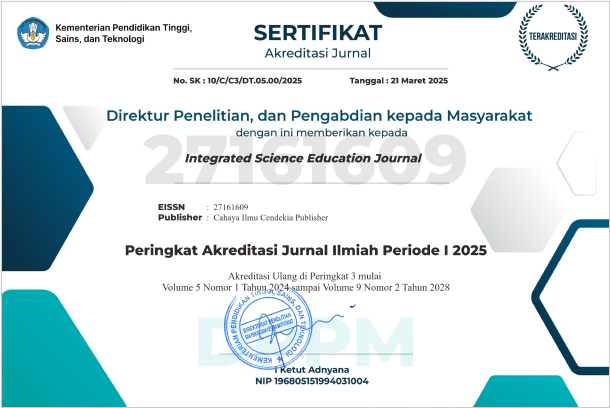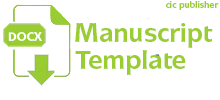The Effects of Standardized Tests on Incorporating 21st Century Skills in Science Classrooms
Abstract
Purpose of the study: The aim of this article was to investigate how the unintended side effects of standardized testing cause teachers not to integrate 21st century skills i.e., communication, collaboration, creativity, and critical thinking, into science classes. In addition, this study also cross-examineed if certain features of standardized testing have any beneficial impact on the adoption of 21st century skills in science teaching.
Methodology: This paper followed the method of narrative review. 85 papers were initially selected after the primary searches. Finally, 30 papers were used to answer two research questions in this article.
Main Findings: After analyzing the selected papers, this narrative review revealed three unintended outcomes of standardized testing on the practice of 21st century skills, which are: teachers often prioritize testing over teaching, which results in the fact that there is not enough time for innovative instruction, and the time spent on the actual content of the curriculum is often shortened. On the other hand, the review also found that standardized tests can motivate teachers and enable them to offer their students new opportunities to incorporate 21st century skills into science education by following Assessment guidelines and expanding curricular opportunities.
Novelty/Originality of this study: This study revealed how standardized test-based education practices in science teaching can be analyzed and customized to create a space for cultivating 21st century skills for students.
References
R. Harshbarger, “Learning in the 21st century: A study addressing educational trends and implications,” Doctoral dissertation, Univ of Central Florida, Florida, USA, 2016. [Online]. Available: https://stars.library.ucf.edu/etd/5043/
C. S. Amadi, “The integration of 21st-century skills in science: A Case Study of Canada and the USA,” Education and Urban Society, vol. 55, no. 1, pp. 56–87, Jan. 2023, doi: 10.1177/00131245211062531.
National Science Foundation (NSF), “Women, minorities, and persons with disabilities in science and engineering,”: 2019. [Online]. Available: https://ncses.nsf.gov/pubs/nsf19304/
J. H. McMillan, “The impact of high-stakes test results on teachers’ instructional,” 2005. [Online]. Available: https://eric.ed.gov/?id=ED490648
Partnership for 21st Century Skills, “21st century readiness for every student: A policymaker’s guide,” 2009, [Online], Available: http://www.p21.org
D. D. R. Errabo, M. B. Berdan, and M. S. Prudente, “Elucidation of essential maps for 21st-century skills and information media literacy,” ACM International Conference Proceeding Series, pp. 276–280, 2019, doi: 10.1145/3306500.3306553.
A. Muhammad, U. Akuche, and T. Aliyu, “Influence of high-stakes tests on students’ attitude towards learning science in senior secondary schools in Nigeria,” Int J Innov Educ Res, vol. 10, no. 7, pp. 60–78, Jul. 2022, doi: 10.31686/ijier.vol10.iss7.3784.
E. Rubin, C Roch, and S. Roch, "Grading teacher performance appraisal systems: understanding the implications of student test scores and performance information use." Public Performance & Management Review, vol 46, no. 2, pp. 257-284, 2023. https://doi.org/10.1080/15309576.2022.2118798
D. L. Yeary, “A case study of middle school teachers’ preparations for high-stakes assessments,” Ph.D. dissertation, Walden Univ., Walden, USA, 2017. [Online] Available: https://www.proquest.com/openview/7cdf094000f8adf2a9c233a58be2b06f/1?pq-origsite=gscholar&cbl=18750
R. E. Sutton, “Teaching under high-stakes testing: Dilemmas and decisions of a teacher educator,” Journal of Teacher Education, vol. 55, no. 5, pp. 463–475, Nov. 2004, doi: 10.1177/0022487104270186.
L. Schoen and L. D. Fusarelli, “Innovation, NCLB, and the fear factor: The challenge of leading 21st-century schools in an era of accountability,” Educational Policy, vol. 22, no. 1, pp. 181–203, Jan. 2008, doi: 10.1177/0895904807311291.
L. McNeil, and A. Valenzuela, “The harmful impact of the TAAS system of testing in Texas: Beneath the accountability rhetoric.,” 2000.
Smith, M. L., & Rottenberg, C. (1991). “Unintended consequences of external testing in elementary schools.,” Educational Measurement: Issues and Practice, vol 10, no. 4, pp 7-11, 1991. [Online]. Available: https://doi.org/10.1111/j.1745-3992.1991.tb00210.x
J. J. Lawley, J. Moore, and A. Smajic, “Effective communication between preservice and cooperating teachers.,” The New Educator, vol. 10, no. 2, pp 153-162, 2014, doi: 10.1080/1547688X.2014.898495
M. Minarechová, "Negative impacts of high-stakes testing." Journal of Pedagogy, vol. 3. No. 1, pp 82-100, 2012, doi: 10.2478/v10159-012-0004-x
H. R. Milner, “Scripted and Narrowed Curriculum Reform in Urban Schools.,” Urban Education, vol. 48, no, 2, pp 163–170, 2013, doi: 10.1177/0042085913478022
W. Mathis, "Based options for education policymaking: common core state standards." National Education Policy Center, 2012. [Online]. Available: https://files.eric.ed.gov/fulltext/ED537412.pdf
R. Benton, “Teachers’ ability to foster student creativity in the high-stakes testing environment,” Doctoral dissertation, Cabrini Univ, Pennsylvania, USA, 2022. [Online]. Available: https://www.proquest.com/docview/2662750128?pq-origsite=gscholar&fromopenview=true.
S. Collins, M. Reiss, and G. Stobart, “What happens when high‐stakes testing stops? Teachers’ perceptions of the impact of compulsory national testing in science of 11‐year‐olds in England and its abolition in Wales,” Assessment in Education: Principles, Policy & Practice, vol. 17, no. 3, pp. 273–286, Aug. 2010, doi: 10.1080/0969594X.2010.496205
O. Ioannidou, K. Finch, and S. Erduran, “Secondary teachers’ views about teaching and assessing the diversity of scientific methods in practical science,” Journal of Education for Teaching, vol. 48, no. 5, pp. 592–608, Oct. 2022, doi: 10.1080/02607476.2021.2006572.
I. Abrahams, M. J. Reiss, and R. M. Sharpe. "The assessment of practical work in school science." Studies in Science Education, vol. 49, no. 2, pp 209-251, 2013.
A. Cullinane, S. Erduran, and S. J. Wooding, “Investigating the diversity of scientific methods in high-stakes chemistry examinations in England,” International Journal of Science Education, vol. 41, no. 16, pp. 2201–2217, Nov. 2019, doi: 10.1080/09500693.2019.1666216.
J. Foster and D. Polly, "Examining teacher perceptions of the current state of testing and assessment," in handbook of research on digital-based assessment and innovative practices in education, IGI Global, 2022, pp. 201-214, doi: 10.4018/978-1-6684-2468-1.ch010
S. S. Yeh, “Limiting the Unintended Consequences of High-Stakes Testing.,” EPAA, vol. 13, p. 43, Oct. 2005, doi: 10.14507/epaa.v13n43.2005.
R. M. Pringle and S. C. Martin, “The Potential Impacts of Upcoming High-Stakes Testing on the Teaching of Science in Elementary Classrooms,” Res Sci Educ, vol. 35, no. 2–3, pp. 347–361, Sep. 2005, doi: 10.1007/s11165-004-5599-z.
E. L. Baker, P. E. Barton, L. Darling-Hammond, E. Haertel, H. F. Ladd, R. L. Linn, D. Ravitch, R. Rothstein, R. J. Shavelson, and L. A. Shepard, "Problems with the Use of Student Test Scores to Evaluate Teachers. EPI Briefing Paper# 278." Economic Policy Institute, 2010. [Online]. Available: https://files.eric.ed.gov/fulltext/ED516803.pdf
G. J. Cizek, “High-stakes testing: Contexts, characteristics, critiques, and consequences,.” In S. M. Downing & T. M. Haladyna (Eds.), Handbook of test development (pp. 49-65), 2006. Lawrence Erlbaum Associates
A. Jonsson and L. Leden, “The ambiguous influence of high-stakes testing on science teaching in Sweden,” International Journal of Science Education, vol. 41, no. 14, pp. 1926–1943, Sep. 2019, doi: 10.1080/09500693.2019.1647474.
S. C. Kong, “Developing information literacy and critical thinking skills through domain knowledge learning in digital classrooms: An experience of practicing flipped classroom strategy.,” Computers & Education, vol. 78, pp 160-173, 2014, https://doi.org/10.1016/j.compedu.2014.05.009
G. Couros, “The innovator’s mindset: empower learning unleash talent, and lead a culture of creativity,” Dave Burgess Consulting, Incorporated, October, 2015.
H. Li and Y. Xiong, “The relationship between test preparation and state test performance: Evidence from the Measure of Effective Teaching (MET) project,” EPAA, vol. 26, p. 64, May 2018, doi: 10.14507/epaa.26.3530.
Marassa, Michael, "Policy Advocacy: Adoption the 4 C’s Rubrics into Illinois Vision 20/20" (2017). Dissertations. National Louis University, Chicago, Illinois, USA. https://digitalcommons.nl.edu/diss/294
L. A. Donnelly, and T. D. Sadler, "High school science teachers' views of standards and accountability." Science Education Policy, vol. 93, no. 6, pp.1050-1075, April, 2009, doi: 10.1002/sce.20347
C. Kivunja, “Exploring the pedagogical meaning and implications of the 21st-century skills ‘super skills’ for the 21st century through Bruner’s 5e lenses of knowledge construction to improve pedagogies of the new learning paradigm,” Creative Education, vol. 06, no. 02, pp. 224–239, 2015, doi: 10.4236/ce.2015.62021.
E. A. Dare, K. Keratithamkul, B. M. Hiwatig, and F. Li, “Beyond Content: The Role of STEM Disciplines, Real-World Problems, 21st Century Skills, and STEM Careers within Science Teachers’ Conceptions of Integrated STEM Education,” Education Sciences, vol. 11, no. 11, p. 737, Nov. 2021, doi: 10.3390/educsci11110737M.
C. Machado, and D. Laverick, "Technology integration in K-12 classrooms: The impact of graduate coursework on teachers’ knowledge and practice." Journal of Technology and Teacher Education 23.1 (2015): 79-106.
Copyright (c) 2023 Lizoon Nahar

This work is licensed under a Creative Commons Attribution-NonCommercial 4.0 International License.
Authors who publish with this journal agree to the following terms:
- Authors retain copyright and acknowledge that the Integrated Science Education Journal is the first publisher licensed under a Creative Commons Attribution 4.0 International License.
- Authors are able to enter into separate, additional contractual arrangements for the non-exclusive distribution of the journal's published version of the work (e.g., post it to an institutional repository or publish it in a book), with an acknowledgment of its initial publication in this journal.
- Authors are permitted and encouraged to post their work online (e.g., in institutional repositories or on their website) prior to and during the submission process, as it can lead to productive exchanges and earlier and greater citation of published work.







.png)
.png)






